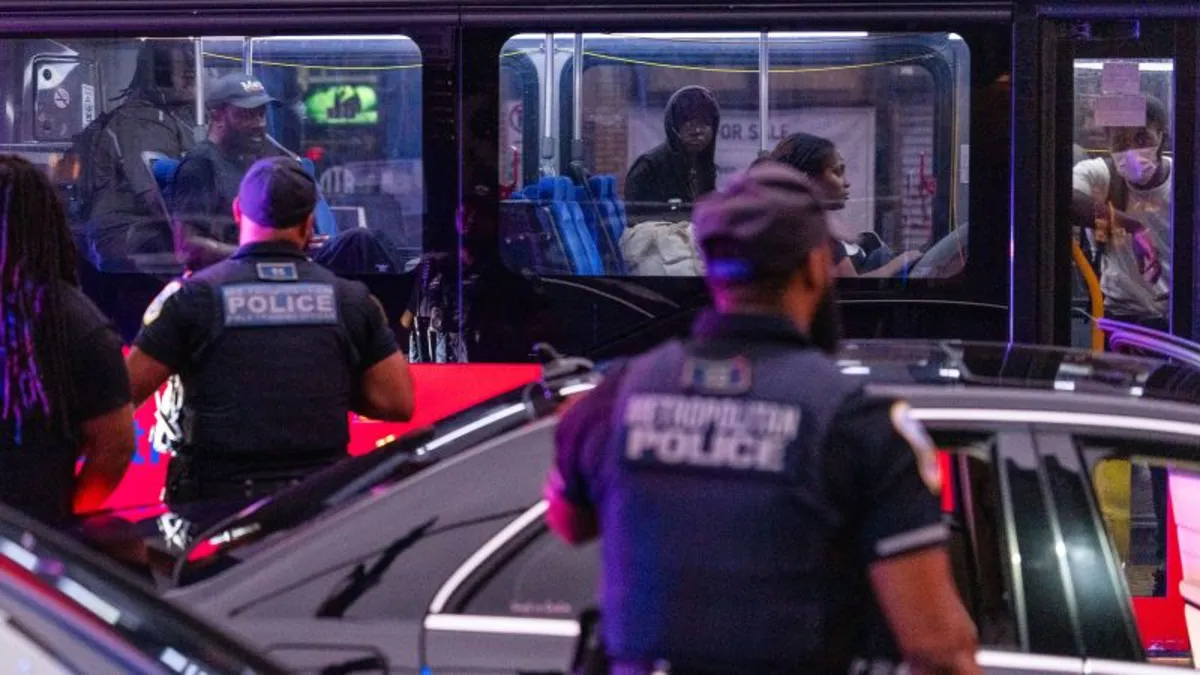
In the wake of the White House's decision to seize control of Washington, DC's police force, a striking shift in local crime statistics has emerged. During the first week of federal oversight, which began on August 12, there was a noticeable decrease in reported crime across the city, alongside a substantial rise in the arrests of immigrants. A detailed analysis by CNN of government data reveals these significant trends during a pivotal time in DC's law enforcement landscape.
According to the latest public data from the Metropolitan Police Department (MPD), property crimes in the district saw a decrease of approximately 19% compared to the previous week, while violent crimes dipped by about 17%. Notably, certain categories of crime exhibited dramatic declines; robberies and car break-ins fell by more than 40%. However, not all crime categories reflected this trend. The data indicated a steady rate in other thefts, a 6% rise in burglary cases, and a 14% increase in assaults involving a dangerous weapon.
Despite the overall reduction in crime, there have been two murders recorded since President Donald Trump signed an executive order to take control of the MPD. However, this aligns with recent weeks' statistics in DC, with no murders reported after August 13.
While crime rates have shown a moderate decrease, the deployment of federal agencies, including Immigration and Customs Enforcement (ICE), has led to a dramatic increase in the arrests of immigrants. Since August 7, federal officials have apprehended 300 individuals lacking legal immigration status in DC, marking a more than tenfold increase in arrests compared to typical ICE figures for the area. Historically, the agency averaged about 12 arrests per week in DC during the first half of Trump's term, as reported by the Deportation Data Project.
ICE agents, who are closely working alongside MPD officers, are prepared to detain anyone questioned during traffic stops or other law enforcement interactions, if they are found to be in the country unlawfully. This has raised alarms among local leaders, including DC Mayor Muriel Bowser, who expressed concerns that the federal takeover is being used as a pretext for increased immigration enforcement.
The response from the White House has been defensive, with spokeswoman Abigail Jackson arguing that the media is downplaying the "exceptional results" stemming from Trump's initiatives in DC. She emphasized the significance of the crime reductions for residents and visitors alike. However, the surge in immigration arrests has led to skepticism about the true objectives of the federal intervention.
Mayor Bowser highlighted a recent order from Attorney General Pam Bondi that seems to prioritize immigration enforcement and the crackdown on homeless encampments, suggesting that the focus is not solely on public safety. In reaction, DC's attorney general has initiated a lawsuit challenging Bondi's directive, claiming it undermines local sanctuary laws that limit cooperation with ICE.
The local community's sentiment towards the federal intervention is largely negative. A recent poll indicated that about 80% of DC residents oppose Trump's police takeover and the deployment of federal resources to the city. Despite this opposition, Vice President JD Vance and other administration figures have dismissed these findings, asserting that the increased federal presence is welcomed by many.
As details continue to unfold, the situation remains fluid. The crime statistics may change as more data is entered into the MPD's database, and ongoing investigations into potential data manipulation by the MPD are underway. Trump has claimed that the federal oversight has resulted in a public safety "miracle," referencing the absence of reported homicides for a week, though local officials have pointed out that this is not a unique occurrence.
Protests against the heightened federal presence have also emerged, with residents rallying in response to sightings of ICE agents and other federal officers. The Justice Department has indicated that Trump's authority to control the MPD will conclude after the 30-day period outlined in the Home Rule Act, but the future of federal involvement remains uncertain as the president has suggested he could extend their presence indefinitely.
The situation in Washington, DC, exemplifies the complex interplay between crime rates, immigration enforcement, and federal control over local law enforcement. As the community navigates these changes, the implications for public safety and immigrant rights will continue to be a focal point of discussion and debate.